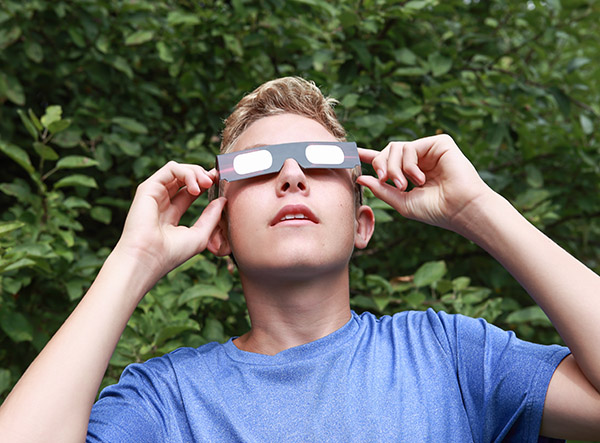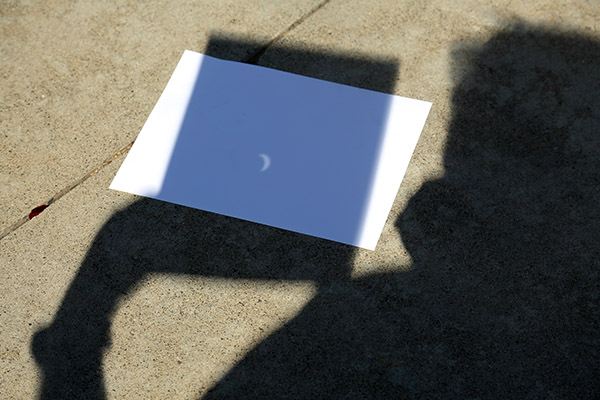Your Guide to Enjoying the Solar Eclipse Safely in Northcentral PA
By Kristy Warren
A special cosmic event is just around the corner! A total solar eclipse will take place on Monday, April 8, 2024, from approximately 2 pm to 4:30 pm eastern standard time (EST). The eclipse will leave lasting memories, but if you're not careful, it can leave lasting eye damage, too.
Are you prepared to enjoy the eclipse safely? The Laurel Health Centers have prepared your guide to enjoying the solar eclipse safely in northcentral PA.
Why is an eclipse more dangerous than a regular sunny day?
You may be wondering "why all the extra fuss around eclipse safety... after all, isn't the sun in the sky every day?" While it's always good advice not to stare directly at the sun, there are a few factors at play that make viewing an eclipse without protection more likely to cause eye damage.
Firstly, an eclipse is novel and exciting. A total eclipse happens rarely, which means people are more likely to look directly at the sun to check its status and watch for longer than they would otherwise. During an eclipse, our natural protective impulse to shield our eyes and look away from the sun is lessened and can result in serious eye damage. Those who want to watch the entire eclipse in northcentral PA will be exposed to afternoon sunlight for hours, so it's important not to forget your sunscreen to avoid sunburn!
One of the biggest risks during the eclipse is not using protective equipment or using the wrong eyewear.
Using regular sunglasses or lens with a low filter can make the sun's bright visible light feel tolerable enough to watch while failing to protect you from harmful ultraviolet light and infrared (IR) radiation that can burn your retina.

UV and IR light can cause permanent damage to your eyes very quickly, which is why it's absolutely necessary to use authentic eclipse eyeglasses or solar viewers to look at the eclipse.
Another opportunity to slip up in safety comes during the totality phase. Totality occurs when the moon completely covers the sun during the eclipse. Our eyes become dilated when it's dark to allow us to see better in low light. This means your eyes will dilate during the darkness of totality. When your eyes are dilated, they let in more light.
This eclipse phase may last up to a few minutes in areas that fall into the path of totality during Monday's eclipse. If you remove your eclipse glasses or solar viewer during totality, you may not get them back on quickly enough before you are abruptly re-exposed to powerful light as the sun begins to re-emerge. Think about how much a bright light hurts your eyes when it's suddenly turned on in the middle of the night—now imagine that with the much more intense and dangerous strength of sunlight!
Tioga, Lycoming, and Bradford Counties in northcentral PA are close to but not directly in the path of totality. Parts of these counties will likely experience a near total eclipse around 3:20 pm EST with a small portion of the sun remaining visible even during the "totality" phase. This means eclipse glasses or solar viewers will be necessary for looking directly at the eclipse at any point during the event in our area.
Your Guide to Enjoying the Solar Eclipse Safely in Northcentral PA
Now that we know why the eclipse can be dangerous, how do we avoid damaging our eyes or skin? The Laurel Health Centers will walk you through a handy checklist guide with the dos and don'ts of eclipse safety. Learn how to assure you and your loved ones can make the most out of your eclipse experience safely.
1) Don’t look directly at the eclipse without wearing authentic eclipse glasses or using an official handheld solar viewer. Eclipse equipment is specifically designed for safe, prolonged solar viewing. They use special filters many times darker than regular sunglasses. Eclipse viewers block the bright visible light as well as ultraviolet (UV) and infrared (IR) radiation from the sun.
2) Do check that your eclipse equipment was purchased from a reputable retailer to avoid dangerous knockoffs. The online marketplace has been flooded with cheap replicas using fake ISO stickers that do not meet the necessary standards to protect your eyes. If you are unsure, click here to check your item against the list of safe suppliers listed by the American Astronomical Society.
3) Don’t use sunglasses, binoculars, cameras, smart phones, or telescopes for direct viewing. Standard lenses do not provide the required protection to safely look at the sun or eclipse directly. Cameras, binoculars, and telescopes must be outfitted with special equipment to be considered eclipse safe. You should not use your eclipse glasses or solar viewer in conjunction with cameras, telescopes, or binoculars because those viewers are made only for looking at the eclipse with your eyes.
4) Do inspect your eclipse equipment closely for damage before using it. Check for scratches, holes, or tears. Any damage to eclipse glasses or solar viewers can compromise viewing safety. If the equipment is damaged, do not use it.
5) Don’t have the right equipment? Watch the eclipse indirectly. Safe indirect methods for watching the eclipse include pinhole projectors that project the event onto the ground or catching a livestream of the eclipse on the web or TV.

Standing with your back to the sun, a simple pinhole through a piece of paper will work to project the eclipse onto the ground, as pictured to the left. Just be sure not to look directly at the sun through the pinhole.
You can also watch professional footage of the eclipse aired online or on TV. Click here on April 8 to watch the eclipse via NASA’s livestream.
6) Do wear sunscreen if you'll be viewing the entire eclipse outdoors! The eclipse will take place slowly over the course of approximately two-and-a-half hours, which means significant time sitting in the afternoon sun. Make sure to wear sunscreen with an SPF of 30+ or higher and look for sunscreen that protects against both UVA and UVB rays. Click here for more information about sunscreen and protecting your skin.
In northcentral PA winters, we experience plenty of inclement weather and weaker sunlight. This means many of us get less time outdoors during the cold months. As a result, your skin may be more sensitive to sunlight after months of limited exposure and as the sunlight grows stronger. Even short periods of time outdoors can result in sunburn, so don't forget your SPF during your eclipse outing.
7) Don't miss out on this unique opportunity to make special memories. Use this handy guide for enjoying the solar eclipse safely in northcentral PA to make the most of your solar eclipse event with coworkers, family, and friends. Happy and safe viewing to all!
